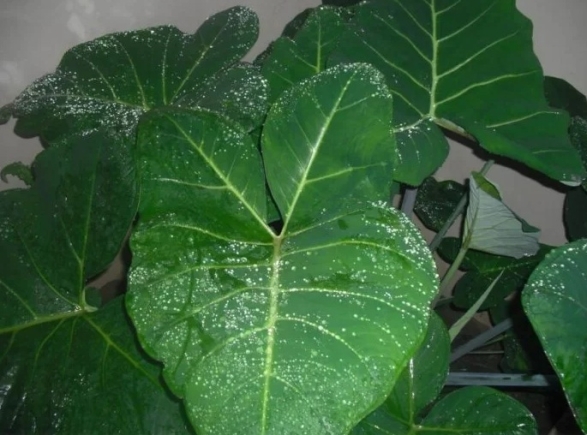At Ohia Nse Mu—the chop bar whose name means “poverty doesn’t discriminate”—food is served hot, fast, and inviting.
The owner, Oboa Ahiafuo (the needy helper), shouts with assurance: “Obiara wɔ mu!” (everyone has a right here), “Obiara sika bɛso no!” (no pocket is too small here).
On display are trusted favourites: fufu with groundnut, palmnut, or garden-egg soup, and kontomire stew with yam or plantain.
A meal guaranteed to “concretise” the foundation of any hardworking patron before they set out on Ghana’s treacherous roads.
Truck drivers arriving from Kumasi at dawn are quick to line up.
Tea and toast are foreign to them.
Their breakfast is a heavy mortar of fufu, or ampesi drenched in kontomire stew—the kind of food that promises strength for the long day ahead.
But here lies the irony. That cassava pounded into fufu may have sprouted from galamsey-tainted soil.
The kontomire leaves, so fresh and green, could be carrying invisible traces of cyanide, mercury, and lead.
The palmnut soup, rich and thick, may be seasoned not only with salt but with the residue of poisoned rivers.
Yet the bar remains full—perhaps out of ignorance of how galamsey has seeped into every facet of Ghanaian life.
Or maybe it is the typical Ghanaian “yɛnnyinaa bɛwu” (we shall all die) philosophy, loosely echoed by boxer Ayitey Powers: “what can come, can come.”
In a land where survival leaves little time for home cooking, many depend on chop bars like Ohia Nse Mu.
As one satisfied customer, Kofi Ghana, declared after clearing his bowl:
“Now I can drive the whole day without looking for another food. I only need to water the concrete, so it doesn’t crack in my stomach.”
Little did he know—the concrete was already crumbling.
His beloved ampesi with kontomire stew, once a symbol of Ghanaian nourishment, had become a silent saboteur.
What should strengthen now weakens; what once healed, now kills.
Kofi set out to make a quick dash to Agona Asafo to see his parents and greet his grandmother before resuming his regular driving business.
He battled through traffic on the Accra–Kasoa highway, then branched onto the Kasoa–Bawjiase road toward his hometown.
But Kofi Ghana never made it. He was struck by a severe stomachache and died shortly after.
At the Kwanyako Health Centre, his grieving family demanded that the body be referred to the Agona Swedru Government Hospital mortuary—but not before a thorough post-mortem.
The report was damning, concentrated toxins—lead, mercury, cyanide—had seeped into his system from galamsey-contaminated food at Ohia Nse Mu.
The family was shattered. Their breadwinner had been snatched by a poisoned meal.
In anger, they marched to the banks of the Okye River near Kwanyako—its waters long destroyed by illegal miners from the Eastern Region.
Ironically, it is from this same source that a water treatment plant supplies Agona, Breman, Gomoa, Effutu, and Senya.
There, the Ebusuapanyin poured libation and cursed any politician who would come merely to offer lip service instead of ending galamsey once and for all.
The Political Faux Pas
Less than 24 hours later, their trap caught two members of the NPP’s communication team.
As expected, the duo stormed the Okye treatment plant, not to seek solutions but to stage partisan theatre: campaigning for their preferred candidate ahead of the January 2026 presidential primaries while tearing into the government’s so-called galamsey fight.
But the people of Agona East were not fooled—they saw through the charade.
These were the same voices who, barely nine months ago, told Ghanaians they could do nothing about galamsey because their electoral success depended on it—even at the cost of innocent lives.
The people were incensed. “What moral authority do you have to accuse anyone?
You think you can always fool us with partisanship?
I curse the day you set foot here to play politics with our lives,” thundered Egyapa Kobina Yesu.
The people’s verdict
The picture is clear: Ghanaians are weary of how politics has intruded into this life-and-death issue. Many believe galamsey is fuelled by the very politicians who promise to end it, but are restrained by their own allies, deeply invested in the trade.
“I don’t want the NPP here at all.
They have caused us the worst pain,” Kobina Yesu warned.
But I am watching President Mahama too.
He started well but seems to be slacking.
Let me remind His Excellency, and anyone who seeks to replace him: if galamsey still festers at this rate, they risk losing 2028.”
My Closing Note
Once, kontomire was celebrated as Ghana’s natural blood tonic—rich, healing, life-giving.
Today, under the shadow of galamsey, it risks becoming a slow, silent killer.
The tragedy of Kofi Ghana is not just the story of one man, but of a nation feeding daily on its own poison.

